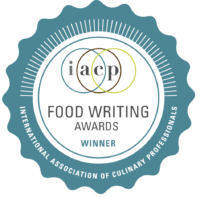These days my blog is sighing in loneliness. I’ve been busy editing the winter issue of Edible Los Angeles. It’s taking up a lot of time, but I’m having a blast, so blog, just deal with it!
One of the articles I assigned for the issue is “What’s In Your Pantry?” I’d asked food writer and culinary historian (and legendary Rolling Stone editor) Charles Perry to write the piece. Typically the writer will interview a chef or some other noted food person. But I knew that Charlie would have the most interesting pantry in town, so I asked him to write about his own stash of exotic flavorings accumulated over his many years of travel throughout the Middle East.
Yesterday, our amazing photographer Tony Molina and I went to Charlie’s for a photo shoot and some dajaj mutajjan, a dish from 13th century Baghdad. It’s made of really basic elements, so anyone could make it, but because it vanished from the Iraqi diet centuries ago, if you visited a restaurant in Baghdad now in search of it, they wouldn’t have a clue what you were asking for!
It was rich and savory and wonderfully flavorful. It was also healthy, easy and fairly quick to make. And it filled the house with the smells of exotic lands and bazaars and my head with dreams of faraway places.
 We enjoyed dajaj mutajjan cooked up in this soapstone pot, which, like cast iron, heats slowly, but cooks evenly and oh so well. This dish was made with chicken, but Charlie assured us that goat works really well, too.
We enjoyed dajaj mutajjan cooked up in this soapstone pot, which, like cast iron, heats slowly, but cooks evenly and oh so well. This dish was made with chicken, but Charlie assured us that goat works really well, too.Food history may sound like an odd or quaint area of interest to some, but it has the power to transport you to another place and time in a most wonderful way, because you can savor the smells, flavors and textures that reveal how people lived in different times and places. Visiting historic sites is important, no doubt, but sampling the food of other places gives you a truly personal way of experiencing the culture as those who live there do (and as their predecessors did).
Language experts like to say that Latin isn’t dead–only the people who spoke it are. Well, these ancient cuisines aren’t dead either. But the taste buds that have never tried them are sound asleep.















